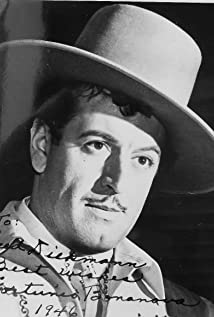Fortunio Bonanova
Spanish-born Josep Lluis Moll studied music in Madrid and at the Paris Conservatoire. Having changed his name to Fortunio Bonanova (which, at the time, would have sounded more becoming of a budding musical star), he went on to make his international opera debut as a baritone in 1922. A protégé of the famous Russian bass Feodor Chaliapin Sr., he was hailed as a major talent and launched on a successful tour of Europe and South America in 1923. For most of the 1920's, he was based in Paris, performing and writing plays and short stories.
His first fling with the movies took place in 1922, when he starred in the title role of Don Juan Tenorio (1922), a Spanish production filmed in Barcelona. During the late 20's and early 30's, he ran his own repertory company in South America. Bonanova subsequently moved to the United States, settling down permanently after the outbreak of the Spanish Civil War in 1936. While in the U.S., he divided his time between appearing on stage (including two performances on Broadway) and acting in small supporting roles in Hollywood. His looks and temperament inevitably got him typecast as excitable, or pompous Latin Americans, Spaniards or Italians. He often played aristocratic dons, opera singers, managers or police chiefs, either humorous and serious.
Many of his appearances on screen were all too brief. At his most memorable, he was the exasperated opera coach Signor Matiste, desperately trying not to lose patience with his talentless pupil, the wife of Citizen Kane (1941). He was also effective as down-on-his-luck Sam Galopis, clumsily attempting insurance fraud in Double Indemnity (1944); and as Carmen Trivago, a sad wannabe opera star, who sees his priceless collection of Caruso recordings smashed to pieces by a brutish Mike Hammer, in the process of coercing him to divulge information in Kiss Me Deadly (1955).
Bonanova played a multitude of similar roles until his retirement in the mid-1960's. He died in Woodland Hills, California, in April 1969 at the age of 74.

